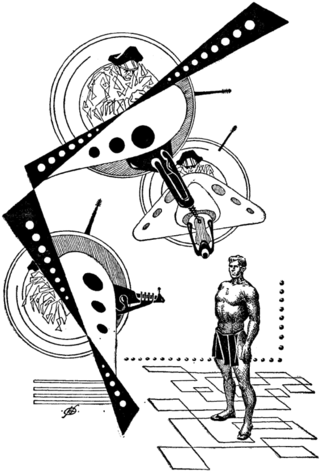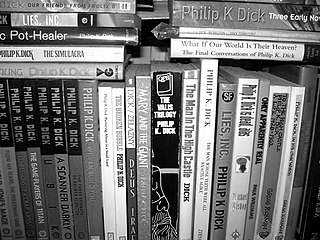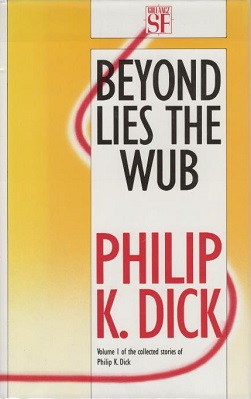Related Research Articles

Heraclitus was an ancient Greek pre-Socratic philosopher from the city of Ephesus, which was then part of the Persian Empire. He exerts a wide influence on ancient and modern Western philosophy, including through the works of Plato, Aristotle, Hegel, and Heidegger.

Philip Kindred Dick, often referred to by his initials PKD, was an American science fiction writer and novelist. He wrote 44 novels and about 121 short stories, most of which appeared in science fiction magazines during his lifetime. His fiction explored varied philosophical and social questions such as the nature of reality, perception, human nature, and identity, and commonly featured characters struggling against elements such as alternate realities, illusory environments, monopolistic corporations, drug abuse, authoritarian governments, and altered states of consciousness. He is considered one of the most important figures in 20th-century science fiction.

The Man in the High Castle is an alternative history novel by Philip K. Dick, first published in 1962, which imagines a world in which the Axis Powers won World War II. The story occurs in 1962, fifteen years after the end of the war in 1947, and depicts the life of several characters living under Imperial Japan or Nazi Germany as they rule a partitioned United States. The eponymous character is the mysterious author of a novel-within-the-novel entitled The Grasshopper Lies Heavy, a subversive alternative history of the war in which the Allied Powers are victorious.
"Faith of Our Fathers" is a science fiction short story by American writer Philip K. Dick, first published in the anthology Dangerous Visions (1967).

"The Golden Man" is an 11,600-word science fiction short story by American writer Philip K. Dick. It was received by the Scott Meredith Literary Agency on June 24, 1953, and first published in the April 1954 issue of If magazine. The story was illustrated by Kelly Freas in its original publication. The story is set in a post-apocalyptic future where the existence of potentially powerful mutants has become a reality. The mutants are seen as dangerous and have been hunted to death by human beings for years. A golden-skinned mutant called Cris is captured by the government, which attempts to execute him. However, his appearance and abilities to see into the future allow him to escape.
"The Last of the Masters" is a science fiction novelette by American writer Philip K. Dick. The original manuscript of the story was received by the Scott Meredith Literary Agency on July 15, 1953, and the story was published by the Hanro Corporation in the final issue of Orbit Science Fiction in 1954. It has since been reprinted in several Philip K. Dick story collections, beginning with The Golden Man in 1980.
"The Turning Wheel" is a novelette by American science fiction writer Philip K. Dick. It was published in Science Fiction Stories No. 2, 1954.
"Sales Pitch" is a science fiction short story by American writer Philip K. Dick, first published in Future Science Fiction magazine, June 1954. The premise is the omnipresent, intrusive and even aggressive advertising and marketing. At the end of the story, the protagonist is driven mad by a robot who can forcefully market himself, and refuses to take no for an answer. The subject was of concern to Dick, and features in his early works such as The Man Who Japed.

"Shell Game" is a science fiction short story by American writer Philip K. Dick. It was submitted to the Scott Meredith Literary Agency and received by SMLA on December 12, 1953. It was published in Galaxy Science Fiction in September 1954.
"Breakfast at Twilight" is a science fiction short story by American writer Philip K. Dick. It was received by the Scott Meredith Literary Agency on January 17, 1953 and first published in Amazing Stories, July 1954. It appears in the second volume reprint of Philip K. Dick's short stories Second Variety.
"A Little Something for Us Tempunauts" is a science fiction short story by American writer Philip K. Dick. It was first published in the anthology Final Stage in 1974.

The bibliography of Philip K. Dick includes 44 novels, 121 short stories, and 14 short story collections published by American science fiction author Philip K. Dick during his lifetime.
Idios kosmos is people's "own world" or "private world" as distinguished from the "common world". The origin of the term is attributed to fragment B89 of the pre-Socratic philosopher Heraclitus: "The waking have one common world, but the sleeping turn aside each into a world of his own." The term has various interpretations: idios kosmos is associated with dreaming, imagination, and delusion; koinos kosmos with wakefulness, reason, and consensus reality.

"Colony" is a science fiction short story by American writer Philip K. Dick. It was first published in Galaxy magazine, June 1953. The plot centers on an expedition to an uncharted planet, on which the dominant, predatory alien life form is capable of precise mimicry of all kinds of objects. The size and complexity of the mimicked object can vary from simple doormats to whole spaceships with the larger objects usually attempting to trap and "absorb" humans similar to carnivorous plants.
"Not by Its Cover" is a science fiction short story by American writer Philip K. Dick, a "loose sequel" to his first published science fiction short story, "Beyond Lies the Wub". The story continues the former's theme of immortality, although not focusing on a living Wub itself, but rather its fur.

The Collected Stories of Philip K. Dick is a collection of 118 science fiction stories by American writer Philip K. Dick. It was first published by Underwood-Miller in 1987 as a five volume set. See Philip K. Dick bibliography for information about the mass market reprints.

Beyond Lies the Wub is a collection of science fiction stories by American writer Philip K. Dick. It was first published by Gollancz in 1988 and later comprised Volume I of The Collected Stories of Philip K. Dick. Many of the stories had originally appeared in the magazines Fantasy and Science Fiction, Planet Stories, If, Galaxy Science Fiction, Imagination, Space Science Fiction, Fantastic Story Magazine, Amazing Stories, Future, Cosmos, Fantasy Fiction, Beyond Fantasy Fiction, Thrilling Wonder Stories, Startling Stories. The collection was reprinted by Citadel Press in 2003 under the title Paycheck and Other Classic Stories.

The Short Happy Life of the Brown Oxford is a collection of science fiction stories by American writer Philip K. Dick. It was first published by Citadel Twilight in 1990 and reprints Volume I of The Collected Stories of Philip K. Dick. Many of the stories had originally appeared in the magazines Fantasy and Science Fiction, Planet Stories, If, Galaxy Science Fiction, Imagination, Space Science Fiction, Fantastic Story Magazine, Amazing Stories, Future, Cosmos, Fantasy Fiction, Beyond Fantasy Fiction, Thrilling Wonder Stories and Startling Stories. The collection was reprinted by Citadel Press in 2003 under the title Paycheck and Other Classic Stories.

"The Builder" is a science fiction short story by American writer Philip K. Dick. It was first published in the magazine Amazing Stories, in December, 1953-January 1954, with illustration by Ed Emshwiller. Dick had submitted many short stories to magazines and made approximately fifteen sales before becoming a client of the Scott Meredith Literary Agency. This was his first SMLA submission, received by SMLA on July 23, 1952. His second SMLA submission was Meddler, received by SMLA on July 24, 1952. The SMLA file card for "The Builder" shows it was submitted to mainstream magazines The Atlantic Monthly and Harper's before it was submitted to Amazing Stories and has an SMLA sub-agent's notation, "IT ISN'T SCIENCE FICTION".

American author Philip K. Dick (1928–1982) is best known for his science fiction works, but he also wrote non-genre fiction, much of which remained unpublished until after his death. From 1952 to 1960, Dick wrote eleven non-genre novels, only one of which was published during his lifetime. Seven more were published posthumously, but the remaining three – A Time for George Stavros, Pilgrim on the Hill and Nicholas and the Higs – are considered lost. Short plot summaries of these works are preserved among the index cards written by employees of the Scott Meredith Literary Agency, who were responsible for marketing the novels to publishers, while further information can be derived from Dick's letters, and from the testimony of those who knew him.
References
- ↑ Levack, Daniel (1981). PKD: A Philip K. Dick Bibliography, Underwood/Miller, pp. 108-109. ISBN 0-934438-33-1
- ↑ Rickman, Gregg (1989), To The High Castle: Philip K. Dick: A Life 1928-1963 , Long Beach, Ca.: Fragments West/The Valentine Press, p.388 ISBN 0-916063-24-0
- ↑ Beyond Lies the Wub (1988), Gollancz, p. 404 ISBN 0-575-04407-1